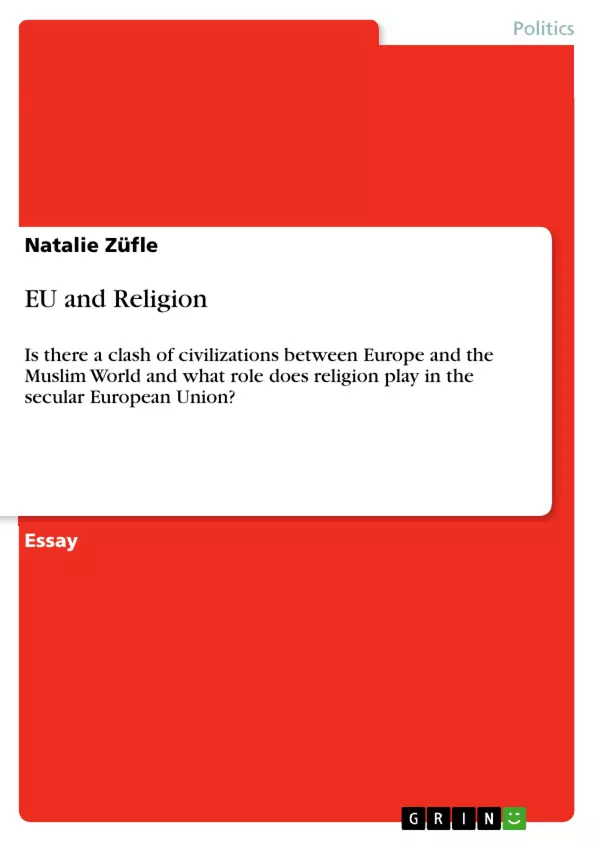It cannot be denied that there are several obvious signs for a clash of civilizations between Europe and Islam (or stated more exactly: conflicts arising in certain areas), letting authors like former German chancellor Helmut Schmidt rashly conclude that “the west and the Muslim world seem far removed from a stable and peaceful co-existence” (Schmidt 2004). But just as Huntington calls for a deeper understanding of religions outside the West and for their (better) integration into (Western) societies (Huntington 1993. p. 49), we have to work a lot yet on removing ignorance to create a stable future for Europe.
Inhaltsverzeichnis (Table of Contents)
- Introduction
- Religion and Secularism in the EU
- Islam in Europe
- Clash of Civilizations?
- Conclusion
Zielsetzung und Themenschwerpunkte (Objectives and Key Themes)
This essay examines the potential for a clash of civilizations between Europe and the Muslim world, specifically focusing on the role of religion in the secular European Union. It explores the growing presence of Islam in Europe, the historical and cultural differences between Western and Islamic civilizations, and the potential for conflict arising from these differences.
- The relationship between secularism and religion in the European Union
- The increasing presence and impact of Islam in Europe
- The concept of a "clash of civilizations" as outlined by Samuel Huntington
- The potential for conflict between Europe and the Muslim world
- The role of cultural and religious differences in fueling potential conflict
Zusammenfassung der Kapitel (Chapter Summaries)
The essay begins by discussing the importance of religion within the EU, despite its official secularism. It highlights the varying levels of religiosity across different European countries and explores the potential for conflict arising from the rapid growth of Islam in Europe.
Drawing on Samuel Huntington's theory of the "clash of civilizations," the essay explores the potential for conflict between Western and Islamic civilizations due to fundamental differences in culture, history, and religion. Several examples are provided to illustrate the potential for conflict, including the murder of Theo Van Gogh, the controversy surrounding Pope Benedict XVI's remarks about Islam, and the ongoing debates over cultural practices like veiling.
Schlüsselwörter (Keywords)
Key terms and concepts explored in this essay include secularism, religion, Islam, clash of civilizations, cultural differences, religious heritage, integration, conflict, and terrorism.
Frequently Asked Questions
What is the "clash of civilizations" theory?
Proposed by Samuel Huntington, it suggests that people's cultural and religious identities will be the primary source of conflict in the post-Cold War world.
How does secularism in the EU affect its relationship with Islam?
The essay explores how the EU's official secularism contrasts with the growing presence of Islam, leading to debates over integration and religious heritage.
What examples of conflict are mentioned in the essay?
The essay mentions the murder of Theo Van Gogh and the controversy surrounding Pope Benedict XVI’s remarks about Islam.
Is a stable co-existence between the West and the Muslim world possible?
The essay discusses different viewpoints, including Helmut Schmidt's concern that stable co-existence seems far removed, while Huntington calls for better integration to avoid conflict.
What role does cultural difference play in potential conflicts?
Cultural differences in history, religion, and practices (like veiling) are seen as factors that can fuel misunderstandings and friction within European societies.
- Citation du texte
- Natalie Züfle (Auteur), 2009, EU and Religion, Munich, GRIN Verlag, https://www.grin.com/document/180058



